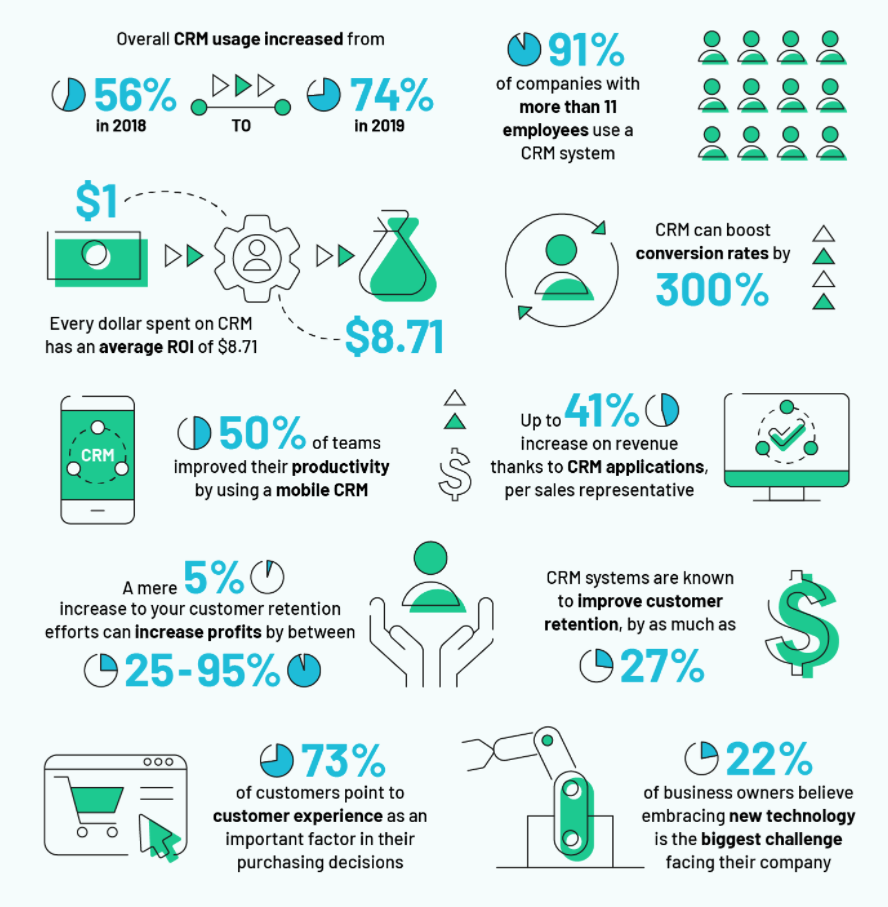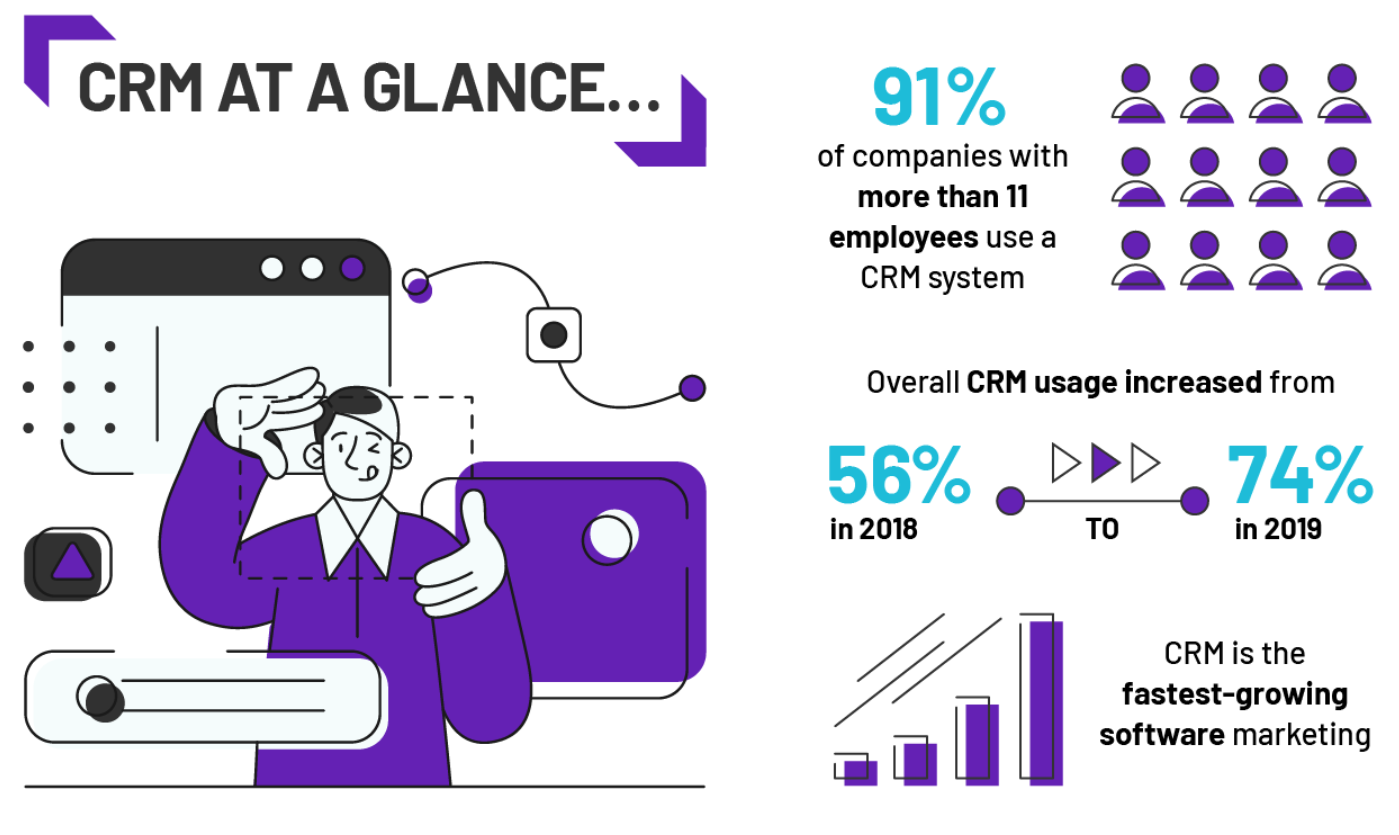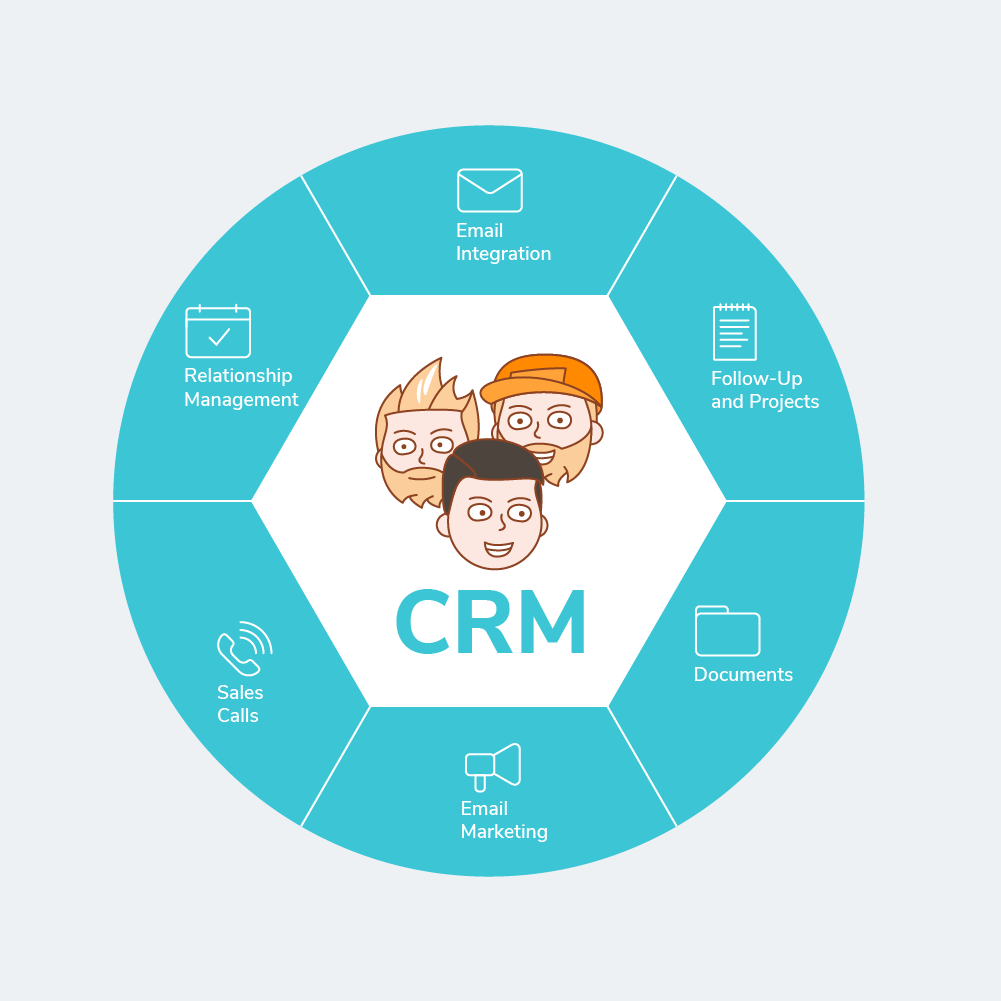Around 91% of companies with more than ten employees already use a customer relationship management system. We are convinced that every business, no matter how big or small, needs a CRM system. Even if you run an agency with a friend, replacing chaotic spreadsheets and notes with reliable software will make all the difference.
To back up our claim, we’ll go through all the advantages of CRM software for businesses.
CRM benefit #1: Transparency
Planners and calendars are good for keeping track of your personal activities. That being said, working with records in Google Sheets isn’t a good idea if you’re a marketer. With spreadsheets, you can track numbers, but you can’t track the success of your marketing campaigns or sales cycle. And what’s the point of measuring KPIs if you can’t visually trace the overall growth and progress?
Transparency and data accessibility are the main benefits of any CRM system. You can track how active, engaged, and satisfied your customers are. Then, there is the inventory side of things — delivery schedules, purchase statuses, product information, and so on. There are also social CRM tools to help you interact with customers and monitor social media.
Let’s look at some key CRM stats.
 Statistics reveal the benefits of CRM software for business; source: Tech.co
Statistics reveal the benefits of CRM software for business; source: Tech.co
A typical CRM system is a multifunctional tool that works as an advanced calendar, collecting all your contacts, events, contracts, and projects in one place. It also provides you with all the necessary analytics — never lose track of anything again.
CRM benefit #2: Generate sales 24/7
This benefit of CRM software is especially true for both in-the-field sales teams and remote sales teams. They need the right tools to achieve and surpass their goals while staying connected to the rest of the company. A good CRM system can help with those aspects.
Every member of your remote sales team can easily access customer data, see important notifications, and react to them right away. Field representatives can also see and make changes in your database at any time. User-friendly CRM software makes it as easy as chatting with a friend on Facebook because it reduces back and forth emails and increases the overall speed of the sales process.
Your team members can make business trips and work from different places and time zones while keeping their finger on the pulse. With mobile CRM solutions, they can engage prospects and customers whenever they receive outreach.
Also, if your clients call or message your company outside of business hours, they will still get an automated reply and all the necessary information 24/7. Customers can come from a variety of sources, but you won’t miss a single request.
CRM benefit #3: Keep everyone in the loop
CRM software may appear complicated at first, but, in fact, it only minimizes your routine and maximizes the resources of your team. Once you’ve got it up and running, you will have all of your team members included in the conversation. Another benefit of a CRM system is that it brings together data from different departments throughout the company to give you a bird’s-eye view of each lead in real-time.
Your marketing team can target specific campaigns while your sales team reaches out to their best prospects — all in complete alignment. Newcomers won’t be confused either: many popular CRM tools have little to no learning curve. It will be easy for a new employee to tune in because all lead-related actions are tracked. The days of duplicated tasks and misunderstandings are a thing of the past.
If you’re still in doubt, check out these numbers:
 Stats show that the CRM market is booming; source: Tech.co
Stats show that the CRM market is booming; source: Tech.co
It’s also beneficial for team leaders and HR professionals. With a CRM system, you keep a close eye on who’s working on what without being intrusive and micromanaging. It’s becoming easier to identify (and reward!) the most dedicated team players who, for example, close large deals or finish all their tasks on time.
CRM benefit #4: Automate and enhance sales
When your customer base is automated, you immediately see leads, prospects, and closed deals. All the information about calls, customer actions, and their preferences are right there in your CRM dashboard. You can identify and fill in the gaps in your sales processes, such as missed calls or unanswered emails. When your sales team reps see a customer’s history, they make more relevant and personalized offers. As a result, the conversion improves, and the sales cycle gets shorter and smoother.
Many CRM solutions offer the option to score leads, track their journey, and monitor purchase histories. This will help you discover quality leads, upsell, and cross-sell. With this information at hand, you can start nurturing leads with personalized emails, special offers, and discounts to increase conversion rates. These campaigns, thanks to the advantages of CRM tools, can be fully automated.
CRM benefit #5: Secure your data
When you use multiple programs and contact databases, your data becomes vulnerable. With a centralized CRM system, you consolidate your commercial and confidential information — the fewer platforms that have your data, the less risk. After signing up for a specific CRM system, you can import leads from multiple sources and set restrictions on who from your team can access specific data.
Many CRM systems offer advanced security features, like:
- encryption;
- audit logs;
- IP restrictions;
- two-factor authentication.
Many CRM solutions are cloud-hosted, meaning they offer accessibility and scalable architecture for businesses of all sizes. You can update your plan as your business grows — there is no need to worry about servers and their maintenance. Among other CRM benefits, there are also integrations with third-party productivity systems and apps. That means you won’t lose a single byte of your data.
CRM benefit #6: Reduce churn and improve customer experience
A high churn rate means you have many disappointed or uninterested clients. Many people stop buying from a brand after having just one negative experience, and you want to make sure your products do not fall into oblivion for the same reason. CRM systems allow your customer service representatives to track customer inquiries and how they were resolved.
This diagram shows that every CRM system is like an all-in-one toolkit.
 A CRM software helps you take care of marketing campaigns, customer inquiries, and sales with a single tool
A CRM software helps you take care of marketing campaigns, customer inquiries, and sales with a single tool
Enjoying the advantages of CRM software, you can focus on customer service and pinpoint the areas that need improvement. It will help you align marketing, sales, and customer service activities. The end goal is to polish the customer experience and build lasting customer trust.
Driving the point home
Let’s go over what we’ve just discussed. By using a CRM system, you:
- discover more sales opportunities;
- provide 24/7 customer support;
- add more flexibility to the workflow of your entire team;
- keep track of all customer interactions;
- increase customer retention;
- keep your valuable data in one place;
- make the progress of your business visible.
As you see, the benefits of CRM systems outweigh potential risks, such as unplanned expenses and data loss during your transition to a new platform. A good CRM system offers solutions for smooth data migration from spreadsheets or other CRM systems. And there always are programs and support systems ready to help your team with deployment and onboarding.
To sum it up, a CRM system is a glue that holds all of a company’s customer-facing processes together and allows for painless alignment of your sales, logistics, support, and marketing teams. It helps you make quick and informed decisions and increases the productivity of your whole team.
Not quite ready yet to implement a CRM plan? You can also upgrade your business by automating your email marketing and messenger campaigns with the help of SendPulse. It only takes a few minutes to get started! Try it for free and connect with your audience on the channels they prefer.